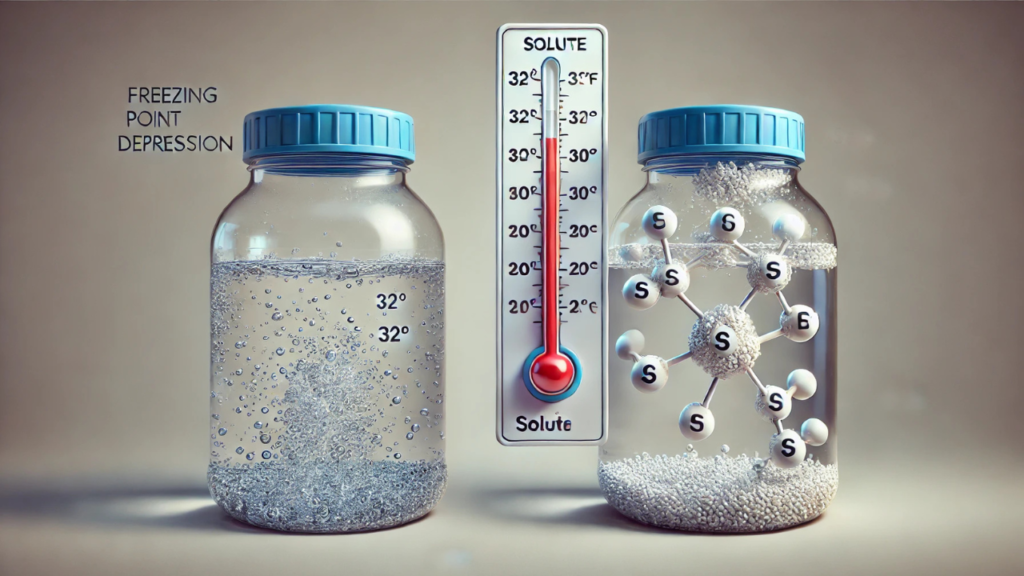Water Softener Lower Freezing Point? Winter Plumbing Guide
As winter approaches, homeowners in cold climates often worry about the potential for their plumbing systems, including their water softeners, to freeze. One common question that arises is: Does a water softener lower the freezing point of water?
In this comprehensive guide, we’ll explore the science of freezing point depression, how water softeners work, and provide practical steps to protect your plumbing and water systems from winter damage.
Key Takeaways:
- Softened water may have a slightly lower freezing point due to sodium replacing calcium and magnesium ions.
- Freezing point depression occurs when salts disrupt water molecule bonding, allowing water to stay liquid at lower temperatures.
- The impact of a water softener on the freezing point is generally minimal for household use.
- Hard water has a slightly higher freezing point compared to softened water.
- Winterizing your plumbing system is essential to prevent freezing damage, regardless of water hardness.
The Science of Freezing Point Depression

Freezing point depression is a phenomenon that occurs when a solute (like salt) is added to a solvent (like water), which lowers the temperature at which the solvent freezes. In the case of water, salts disrupt the molecular structure, preventing water from freezing at the usual 32°F (0°C).
Why Does Freezing Point Depression Matter?
Adding salts (like sodium from a water softener) to water creates a solution that freezes at a lower temperature. This principle is why salt is commonly used to melt ice on roads during winter months.
Key Takeaway:
When a water softener replaces calcium and magnesium with sodium, it does lower the freezing point of water slightly. However, this effect is minimal and not enough to prevent freezing in extremely cold temperatures.
How Does Softened Water Affect Freezing Temperatures? Winterizing Tips
When water is softened, the calcium and magnesium ions are replaced by sodium or potassium ions. Softened water theoretically has a lower freezing point due to the sodium ions, but the difference is usually too small to make a noticeable impact in household situations.
The Difference Between Hard Water and Soft Water
- Hard Water: Contains high levels of calcium and magnesium, which raise the freezing point slightly. These minerals create scale buildup, which can affect plumbing systems and appliances.
- Soft Water: Softened by replacing calcium and magnesium with sodium, it may have a slightly lower freezing point, but the difference is typically negligible for household use.
| Water Type | Freezing Point | Mineral Content | Effect on Plumbing |
|---|---|---|---|
| Hard Water | Slightly higher (~32°F) | Calcium, Magnesium | Scale buildup, clogs |
| Soft Water | Slightly lower (minimal) | Sodium (replaces calcium) | Less scale buildup, more fluid flow |
Key Takeaway: While softened water may have a slightly lower freezing point, the difference is generally too minimal to prevent freezing under normal winter conditions. Proper winterization of your plumbing system remains the best defense against freezing pipes.
Signs Your Water Softener or Plumbing Is Freezing
If you’re concerned about freezing, watch for these signs:
- Unusually Cold Water Softener: Touch the surface of the water softener to check for cold spots.
- Ice Around the Unit: Visible ice buildup is a clear sign of freezing.
- Reduced Water Flow: A decrease in water pressure could indicate frozen pipes.
- Strange Noises: Unusual sounds from your water softener could mean internal freezing.
Steps to Winterize Your Plumbing System
Properly winterizing your plumbing system is more important than the water type itself. Even if your water is softened, improper insulation can lead to frozen pipes and significant damage.
- Insulate Exposed Pipes: Use foam pipe insulation around outdoor and exposed pipes to prevent freezing.
- Keep Interior Spaces Warm: Ensure areas with your water softener (such as basements or garages) are heated above freezing.
- Use Heat Tape: For areas prone to freezing, apply heat tape or heating cables to provide additional warmth.
- Drain the System: If you’ll be away for a long period, drain both the water softener and your pipes to avoid freezing.
Key Takeaway:
Effective winterization of your plumbing system (including your water softener) is the most reliable method for preventing freezing damage.
How to Protect Your Water Softener From Freezing
For homes in colder climates, protecting your water softener and plumbing is essential:
- Insulate the Water Softener: Use foam or reflective insulation around the unit and pipes.
- Maintain Ambient Temperature: Keep the room where your softener is located above freezing.
- Install Heating Cables: For outdoor installations, self-regulating heating cables can help keep pipes from freezing.
Key Takeaway:
The best way to prevent your water softener from freezing is to insulate it properly and maintain a consistent temperature.
FAQs About Water Softeners and Freezing Points
Can I use my water softener in extreme cold?
While you can use your water softener in extreme cold, it’s essential to ensure that it’s properly insulated and maintained.
How do I recognize if my water softener is about to freeze?
Look for signs like reduced water pressure, cold spots on the unit, or visible ice around the pipes.
Should I turn off my water softener during the winter months?
If you won’t be using it for an extended period, it’s a good idea to drain the system and shut it off to prevent freezing damage.
Can a water softener cause pipes to freeze faster?
No, a water softener doesn’t cause freezing. Insufficient insulation or extreme cold is the main factor in freezing pipes.
What’s the best way to winterize my water softener?
Check salt levels, drain the system if not in use, and insulate both the pipes and the unit.
How often should I regenerate my water softener in winter?
Regenerate every 2-4 weeks during winter, but check regularly for any issues.
Conclusion: Proactive Steps for Winterizing Your Water Softener
While a water softener may slightly lower the freezing point of water, the difference is negligible for most household situations. The most important step in preventing freezing damage is to winterize your plumbing and water softener by ensuring adequate insulation and maintaining a stable temperature. By taking these proactive steps, you can protect your home’s water system from winter’s harsh conditions.







